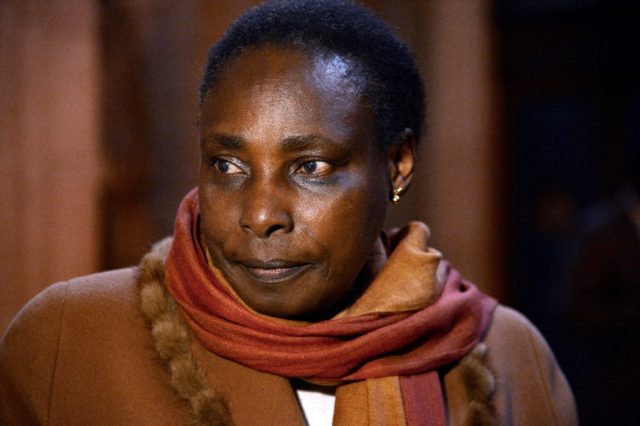The fate of an elderly Rwandan widow, who has spent decades trying to avoid a trial for genocide while living in France, is one of the key sticking points in the delicate process of reconciliation undertaken by Paris and Kigali in recent months.
Rwandan former first lady Agathe Habyarimana is the widow of Hutu president Juvenal Habyarimana, whose plane was shot down in April 1994, an event that acted as a trigger of the 1994 genocide.
The two countries turned the page on a quarter century of tensions over the Rwandan genocide on May 27 when President Emmanuel Macron recognised France’s responsibilities over the slaughter of some 800,000 mostly Tutsi Rwandans.
During a visit to Kigali, Macron admitted that France, which under Francois Mitterrand backed the Hutu regime ahead of the genocide, had “for too long favoured silence over the examination of truth” and asked Rwandans for forgiveness.
He also promised to ensure that no genocide suspects would “be able to avoid justice” in France, where dozens of suspected Hutu extremists fled after the killings.
For Rwandan President Paul Kagame, who led the Tutsi rebellion that ended the massacres in July 1994, Agathe Habyarimana is “top of the list” of suspects he wants brought to justice.
‘Waiting for her to die’?
Days after her husband’s death, Rwanda’s first lady was airlifted to safety in the Central African Republic with a dozen family members on the orders of Mitterrand.
Genocide survivors accuse her of being one of the leaders of a group of extremists within her husband’s inner circle, known as the “akazu” (little house), that masterminded the killings — allegations she denies.
After a first stay in France in 1994, the woman who was widely regarded as the power behind the throne in Rwanda, returned in 1998 to take up residence in a small town on the southern outskirts of Paris.
For the past 13 years she has been under investigation over the bloodshed that caused her to flee her homeland.
Habyarimana, 78, has demanded that the case against her be thrown out — a request she renewed this week at the Paris Court of Appeal after her first bid to have the case dismissed was rejected last year.
The appeal court’s decision is expected on August 30.
Jean-Luc Habyarimana, one of her sons, accused the French judiciary of “hounding” his mother.
“Are they waiting for our mother to die in order to say they have nothing on her?” he asked AFP in a rare interview.
‘Symbol of inaction’
But French investigators say they have failed to assemble enough proof against her to bring charges.
The years-long probe has frustrated activist Alain Gauthier, who has spent two decades building cases against genocide suspects, together with his Rwandan-born wife Dafroza.
It was the Gauthiers who filed the complaint against Habyarimana in 2007 that triggered an investigation for complicity in genocide and crimes against humanity.
“Agathe Kanziga (her maiden name) has become a sort of symbol of the inaction of the justice system” on the Rwandan genocide, Alain Gauthier told AFP.
The Collective of Civil Plaintiffs for Rwanda (CCPR), founded by the Gauthiers, accuses Habyarimana of being a key financial backer of Rwanda’s infamous Radio des Mille Collines station, which incited the slaughter of Tutsi “cockroaches” in vitriolic broadcasts.
It also accuses her of helping draft a hit list of influential Tutsis and moderate Hutus, of ordering the killings of seven employees of an orphanage that she founded and of approving a wave of assassinations conducted by the presidential guard after her husband’s death.
A group of historians commissioned by Macron to examine France’s role in the genocide described her in a landmark report in March as an “extremist character”.
Speaking to France Culture radio at the time, the president of the commission, Vincent Duclert, claimed that she ran the “Zero Network” — another name for the “akazu”, so-called because the purported goal of Habyarimana’s entourage was a Rwanda with zero Tutsis.
‘Inconvenient person’
But French investigators, who have visited Rwanda six times, have failed to come up with compelling evidence against her, according to their reports on the case, which AFP has seen.
The Habyarimana family has cast doubt on the reliability of Rwandan witness statements and accused France of keeping the case open out of “political considerations”, to appease Kagame.
Jean-Luc Habyarimana noted that his mother had never been prosecuted by the International Criminal Tribunal for Rwanda and that her brother, Protais Zigiranyirazo, accused of being one of the leaders of the genocide, had been acquitted by the court.
For years after the Rwandan genocide, France was accused of shielding fugitives but in recent years, as relations with Rwanda improved, it has sped up prosecutions.
Since 2014, a former Rwandan spy chief and two former mayors have been jailed over their roles in the massacres and several other suspects have been charged.
In the case of Habyarimana, however, the authorities appear unsure what to do.
France’s highest court has refused to extradite her and dozens of other suspects to Rwanda on the grounds that the crime of genocide was not on the Rwandan statute books at the time of the massacres.
But French authorities have also refused to grant her asylum, leaving her in legal limbo.
Habyarimana’s lawyer Philippe Meilhac is convinced that France is letting the case drag on “because Mrs Habyarimana is an inconvenient person for diplomatic relations” between France and Rwanda.

COMMENTS
Please let us know if you're having issues with commenting.